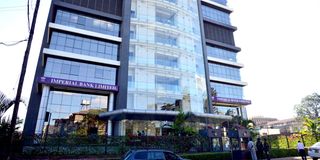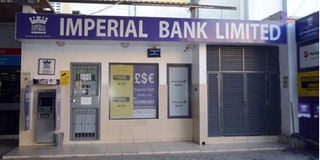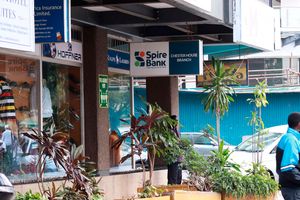
People walk past Imperial Court building along Westlands Road which is the Imperial Bank Limited's head office in Nairobi on October 13, 2015.
A 10-year-old case seeking to recover Sh44.8 billion from former Imperial Bank directors is on the brink of collapse, following the Kenya Deposit Insurance Corporation’s (KDIC) failure to secure attendance of its star American witnesses.
The KDIC, which filed two suits seeking to recover the sums, has been unable to reach a fees agreement with FTI Consulting, the American firm that conducted a forensic audit on the collapsed lender which established that at least Sh44.8 billion had been embezzled.
Parties in such cases usually have to settle travel, accommodation and other costs that their witnesses will incur so as to testify.
Court papers indicate that the KDIC may have had one of the two cases adjourned five times, after failing to secure auditors from FTI Consulting to defend their report, which is the foundation that the recovery suits are built on.
The auditors, aside from defending the report, are expected to be cross examined by lawyers for the former Imperial Bank directors.

Imperial Bank's branch in Likoni, Mombasa County in this picture taken on October 14, 2015.
Case on the brink
High Court judge Francis Gikonyo has given the KDIC one last chance to prosecute the case, or have it dismissed.
That means that at the next hearing, if the KDIC is not ready to proceed, the case will be dismissed.
“Two realities. This case is ten years old. Litigation must be concluded within reasonable time. Nevertheless, this case has a public-interest element which deserves a last chance. Therefore, I order that the case be fixed for hearing on a date to be appointed by the court with consensus amongst the parties, when the plaintiff shall prosecute its case,” Justice Gikonyo said.
“If the plaintiff, for reason attributable to it, fails to prosecute the case on the appointed date, the suit shall stand dismissed. This is self-executing order aimed at ensuring the case is done and also protects the rights of the defendants,” the judge added in his March 26, 2025 ruling.
Since October, 2021 when the case was ready for hearing based on compliance by parties in filing all relevant documents, the case has been adjourned seven times for various reasons, at times the unavailability of witnesses from FTI Consulting.
Legal implications
Most recently, the case was to be heard over three days starting March 25, 2025.
Lawyers Radhika Arora and Noella Lubano of Oraro & Company Advocates for the KDIC requested for another adjournment.
Ahmednasir Abdullahi, for nine of the 10 defendants, protested and asked that the case be dismissed, prompting Justice Gikonyo’s decision.
The KDIC in 2015 filed the suit against eight relatives of former Imperial Bank managing director Abdulmalek Janmohammed, including his mother Gulshan, and company Janco Investments Ltd.
Ms Gulshan and her other sons, Mehdi and Salim, are Mr Janmohammed’s nuclear relatives.
Mr Janmohammed’s nieces Aliya Jahan Ara, Tasneem Abida, Rehena Afshin and Shaista Amal, and his nephew Amynmohamed are also defendants in the case.
The KDIC also went after former Imperial Bank officials Naeem Shah (head of credit) and James Kaburu (chief finance officer).
Mr Janmohammed died on September 15, 2015 aged 56.
On October 13, 2015 the Central Bank of Kenya placed Imperial Bank under receivership after the lender’s Board of Directors approached the regulator and claimed that Mr Janmohammed had been running an elaborate theft scheme for at least 13 years.
The directors claimed that Mr Shah and Mr Kaburu had approached them with details of the theft, with both claiming that Mr Janmohammed arm-twisted them into participating in the scheme.
The CBK placed Imperial Bank under the care of the KDIC, which later appointed FTI Consulting to conduct a forensic audit.
The audit report filed in court revealed that Mr Janmohammed would, with the help of Mr Shah and Mr Kaburu, steal from depositors and stash the funds in bank accounts registered to 20 companies owned by the family of Zulfikar Haiderali Jessa.
At the top of that network of 20 firms was W.E. Tilley, which also featured prominently in the collapse of Charterhouse Bank as a suspected money laundering conduit.
Mr Janmohammed also channeled funds to bank accounts in his mother’s name, and that of Hanscombe Management Ltd, a company that was dissolved in 2002 – approximately the time the theft scheme started.
Interestingly, the FTI Consulting report stated that even after Mr Janmohammed’s death, the theft scheme continued.
Mr Kaburu and Mr Shah allegedly deposited over Sh3 billion in the Hanscombe Management Ltd account, which had primarily been under the control of Mr Janmohammed since 2002.
The KDIC filed one recovery suit against the Jessa family and their companies.
The companies sued were W.E. Tilley, Primecatch (Exports) Ltd, Mara Fish Packers Ltd, J Fish Kenya Ltd, Victorian Delight Ltd, Ruby Red Ltd, Value Pak Foods Ltd, From Eden Ltd, Aqualite Ltd, Marmo E Granito Mines (T) Ltd, Marmo Marble (U) Ltd and Fishways Uganda Ltd.
The Jessas sued were Zulfikar, Nasir, Nargis, Nadir, Firoz, Salim, Ifran and Nashiv.
Both cases were filed on the same day and have been lingering in the courts for nearly 10 years.
bwasuna@ke.nationmedia.com






